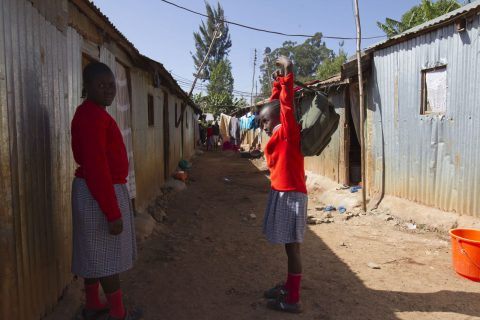
We would love to have you visit us in Nairobi. Visiting our program is a unique way to connect with the people of Kenya. Our partner, Wilderness Inquiry, (a fellow Minneapolis based non-profit) can arrange a visit customized to your needs and schedule:
- Visit us during one of the August camps as a counselor for the full camp schedule. Learn more
- Or for part of camp and add a safari arranged by Wilderness Inquiry. Learn more
- Or anytime during the year for a few days while you are in Nairobi. Let us know at info@ngongroad.org


Life is Difficult in Dagoretti’s Impoverished Villages
Everyday life is a challenge in Nairobi’s impoverished areas. In Dagoretti, a series of “villages” have sprung up. Living conditions are crowded. Most families live in row houses constructed of corrugated steel packed closely together. Each family shares one, or if they are slightly less destitute, two small rooms. Clothing is hung on nails pounded into the walls. There is no running water and almost no one has electricity. Bathrooms are pit latrines shared by multiple families. Food is cooked outdoors with charcoal or wood. The streets are usually dirt and become rutted and muddy during the rainy season.
A Walk is an Adventure
Walking the streets in the Dagoretti “villages” is a fascinating adventure. People of all ages are on the street or in front of their small one-room shops. Many of the people around you are friendly and will smile at you as you walk by. They greet each other with big smiles and handshakes. Children run everywhere. Goats, chickens and the occasional cow all mingle with the people even in these urban areas.
There are shops selling a few vegetables, beauty salons, charcoal dealers and places to get a car battery charged to power a T.V. or radio. The occasional car bumps slowly by passing the hand-drawn two-wheeled carts full of wood, or water or something else to sell. There is always something interesting to see.